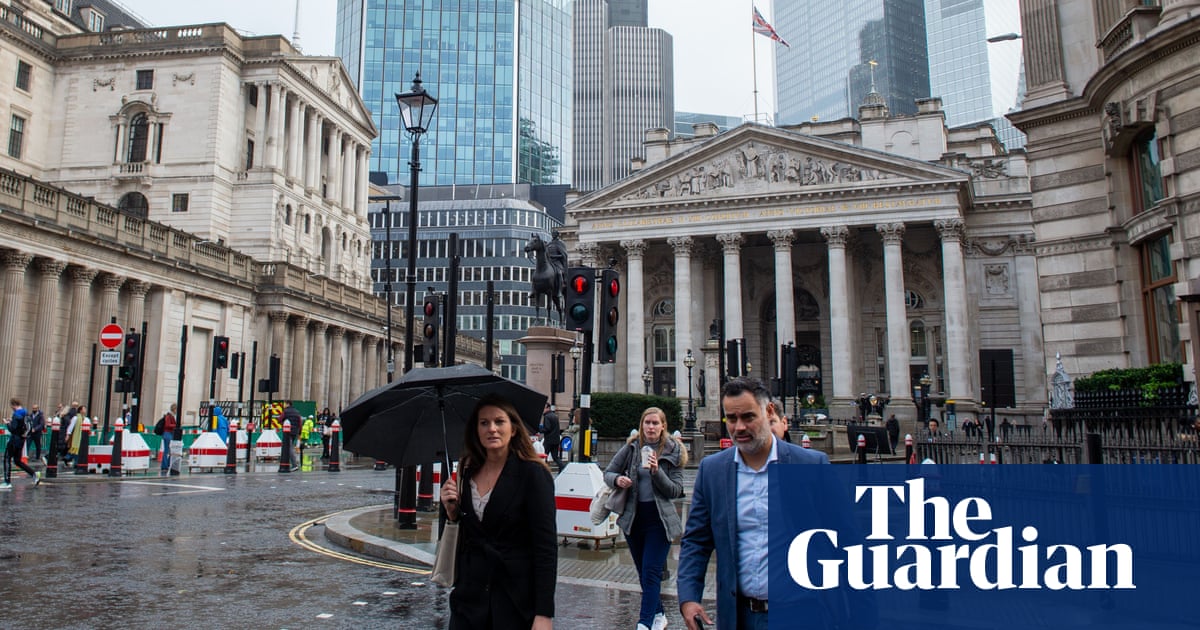
Britain is suffering worse economic performance than its rivals because of Brexit and a stark drop in the size of the workforce since the Covid pandemic, the governor of the Bank of England has said.
Andrew Bailey said a combination of headwinds had prevented the economy from recovering to pre-pandemic levels, while warning it would also take time for the government to repair damage to Britain’s international reputation caused by the disastrous mini-budget under the former prime minister Liz Truss.
It came as rampant inflation of 11.1% – the highest figure since October 1981 – piled more pressure on the Bank to continue raising interest rates.
In a downbeat assessment on the eve of the chancellor’s autumn statement, the Bank’s governor told MPs on the Commons Treasury committee: “I’m afraid it’s not a good story.”
Bailey said UK GDP remained about 0.7% below its pre-Covid level, compared with much stronger recoveries in the eurozone and in the US, where he said the levels of GDP had recovered to about 2.1% and 4.2% above pre-pandemic levels.
“It’s a dramatic difference,” he said. Asked whether Brexit was contributing to the country’s underperformance, he said that “there is an effect” from leaving the EU, including a “long-run downshift” in the level of productivity.
“It’s not [an impact] we’ve been surprised by. As a public official I’m neutral on Brexit per se, but I’m not neutral in saying these are what we think are the most likely economic effects of it,” he said.
In a damning verdict on the mini-budget, Bailey said the UK had “damaged our reputation internationally because of what happened”. Threadneedle Street had been forced to step in with an emergency bond-buying scheme to calm turmoil in government debt markets after Kwasi Kwarteng, the then chancellor, announced almost £50bn in unfunded tax cuts.
Bailey said the meltdown had been raised at the gathering of world leaders and central bank governors at the International Monetary Fund’s annual meeting in Washington last month. “People were saying, ‘we didn’t think the UK would do this.’”
Suggesting that bond market investors had watched Kwarteng’s mini-budget speech unfold in a state of near-disbelief, he said the former chancellor’s plan to abolish the 45p additional rate of income tax had caught attention in particular. “Economically speaking it’s not the biggest thing. [But] the way people in the market put it to me it was, again, is that the right thing to do in this situation?
“The camp of believers in what I call the sort of trickle-down economics of the early 1980s is not a very large camp these days.”
Under questioning from MPs, Bailey said he would not take a pay rise if he was offered one.
Households are under intense pressure from inflation after the rise to 11.1% in October, driven by soaring energy bills and the rising cost of a weekly shop. Data from the Office for National Statistics (ONS) showed the annual inflation rate last month jumped a percentage point from 10.1% in September.
Official figures showed Britain’s economy took the first steps towards a potentially lengthy recession in the three months to September, with a 0.2% decline in GDP in the third quarter. A second consecutive decline in the fourth quarter would mark the technical definition of a recession.
Answering questions from MPs on the Treasury committee, Bailey and three other members of the Bank’s monetary policy committee (MPC) said part of the reason the country was being held back was a sharp decline in the size of the workforce since Covid.
“The UK is a dramatic outlier compared to all of the other advanced economies. This is a puzzle,” said MPC member Catherine Mann. Employment in the UK remains lower than before the health emergency struck, thanks to a rise in older workers leaving the workforce and record levels of long-term ill-health among working-age adults.
Swati Dhingra said Brexit was holding back UK trade and driving up inflation by adding to the cost of imported food and other products. “It’s undeniable now that we’re seeing a much bigger slowdown [in trade] in the UK compared to the rest of the world,” she said.
She said post-Brexit trade barriers had led to a 6% increase in UK food prices, alongside a negative impact on wages and living standards in Britain, adding: “We’re definitely underperforming compared to our peers.”












